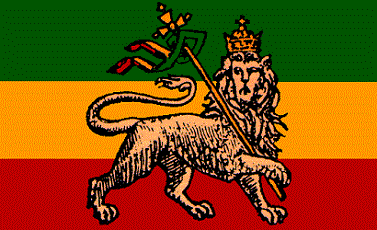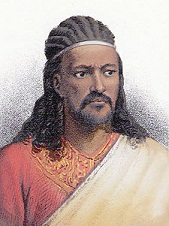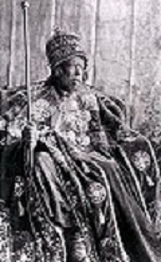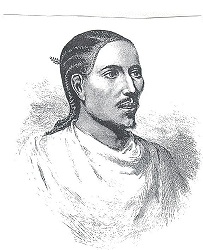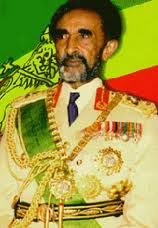History
Ethiopia is the oldest independent country in Africa and one of the oldest in the world. Herodotus, the Greek historian of the fifth century B.C., describes ancient Ethiopia in his writings. The Old Testament of the Bible records the Queen of Sheba's visit to Jerusalem. According to legend, Menelik I, the son of King Solomon and the Queen of Sheba, founded the Ethiopian Empire. Missionaries from Egypt and Syria introduced Christianity in the fourth century. Following the rise of Islam in the seventh century, Ethiopia was gradually cut off from European Christendom. The reunification of Ethiopia began with the rule of Emperor Tewodros. His unsuccessful campaign was continued by Yohannes IV and then Menelik II.Menelik II defeated the Italians in a decisive battle in Adwa The next major ruler was Haile Selassie I. He ruled Ethiopia until the 1970s before he was replaced by Derg.
Tewodros
He was born Kassa Haile Giorgis, but was more regularly referred to as Kassa Hailu (meaning "restitution" and “power"). His rule is often placed as the beginning of modern Ethiopia, ending the decentralized Zemene Mesafint (Era of the Princes).
(1866–89)At the height of his internal power and external prestige, the process of territorial expansion and creation of the modern empire-state had been completed by 1898.Ethiopia was transformed under N?gusä Nägäst Menelik: the major signposts of modernization were put in place.Externally, his victory over the Italians had earned him great fame: following Adwa, recognition of Ethiopia’s independence by external powers was expressed in terms of diplomatic representation at the court of Menelik and delineation of Ethiopia’s boundaries with the adjacent colonies. Menelik II is considered an African icon and one of the most powerful black people in history. Menelik II is credited with establishing modern Ethiopia as well as leading the first African military victory over a Western power during Europe's scramble for Africa. His triumph put Ethiopia in the spotlight among black people in the Americas, inspired other Africans fighting European colonialists, and led the way to Haile Selassie I's fame among the oppressed people in the West. Menelik has been described as one of the most powerful black men in history.
(23 July 1892 – 27 August 1975), born Tafari Makonnen, was Ethiopia's regent from 1916 to 1930 and Emperor of Ethiopia from 1930 to 1974. He was the heir to a dynasty that traced its origins to the 13th century, and from there by tradition back to King Solomon and Queen Makeda, Empress of Axum, known in the Abrahamic tradition as the Queen of Sheba. Haile Selassie is a defining figure in both Ethiopian and African history. Emperor Haile Selassie began an agressive programme of modernization and centralization of the structure of the state. He ordered the drafting of the first written constitution for the Empire, which was completed and promulgated in 1931. The First Imperial Constitution, which borrowed heavily from the Meiji Constitution of Japan, provided for a Parliament for the first time in Ethiopian
Back to Top
